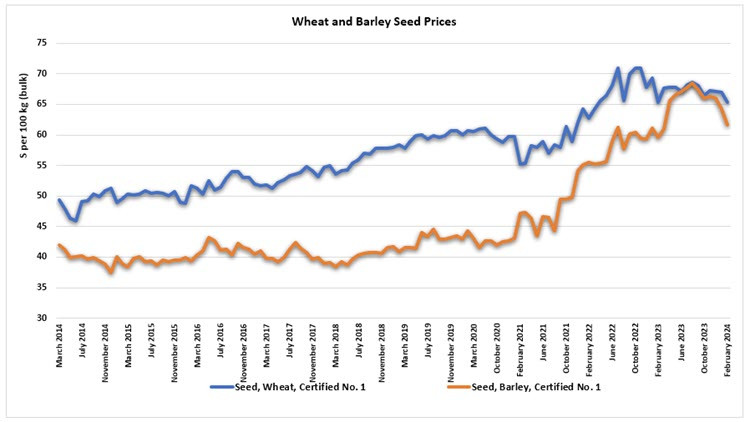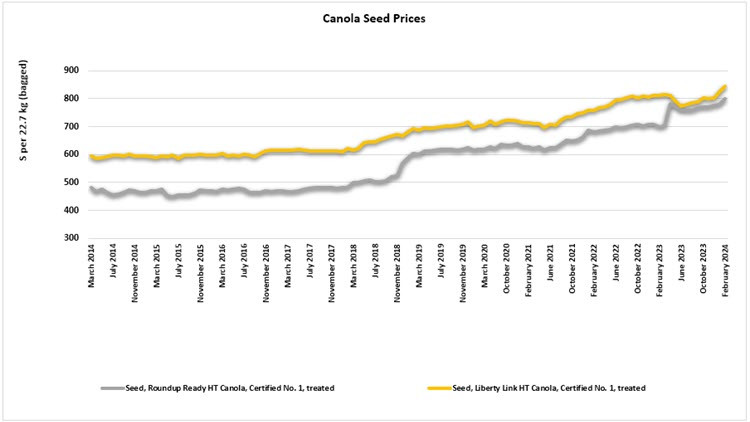Government mail service may be affected by the Canada Post labour disruption. Learn about how critical government mail will be handled.
See event listings and more articles in this edition of Agri-News: April 8, 2024 issue
“Farmers strategically select seeds based on factors such as quality, yield potential, new varieties, field conditions, crop rotation, cost implications, market dynamics and environmental conditions,” says Azam Nikzad, market analyst/coordinating researcher with the Alberta government. “Producers aim to optimize their choices by maximizing productivity and reducing production risk. This article delves into the trends in certified seed prices and examines factors contributing to their cost. The expectation is that these seeds will yield better and ultimately lead to increased revenue for farmers.”
Over the past decade, in Alberta, certified no. 1 wheat seed has shown a general upward price trend until 2022, with an average annual increase of 2%, whereas certified no. 1 barley seed experienced an average annual increase of 3.8%. In 2023, the price of wheat seed began to decrease, while barley seed prices started to decrease in 2024.
Figure 1. Wheat and Barley Seed Prices

Herbicide tolerant Roundup Ready canola seed saw a consistent upward price trend, with an average annual increase of 4.6% over the past decade. Liberty Link canola seed showed a similar trend until 2022, averaging a 3.4% annual increase. Liberty Link canola seed prices decreased slightly in 2023. However, the price of Roundup Ready and Liberty Link canola increased in February 2024 by 2.8% and 2.5%, respectively, compared to January 2024.
Factors that contributed to rising seed prices in recent years include production related challenges in 2021 due to dry conditions along with a pronounced increase in commodity cereal grain and canola prices in 2021 and 2022.
Figure 2. Canola Seed Prices

“Production of certified seed is a meticulous and resource-intensive process, which significantly impacts price,” explains Nikzad. “It takes several years for plant breeders to develop new seed varieties with enhanced traits such as higher yield, drought tolerance, early flowering and maturity, resistance to lodging and disease, insect tolerance and weed control. From breeding new seed varieties to rigorous inspections and compliance testing, each stage contributes to the overall expense of producing high-quality seeds for farmers’ benefit.”
Labour and other operational costs are incurred at each stage of developing and producing certified seed, but there are additional expenses as well. These include licensing fees for intellectual property rights (IPR), as well as considerations related to the length, cost and reliability of the regulatory process. While IPRs encourage innovation, they also contribute to higher seed prices. In the context of Roundup Ready and Liberty Link canola seed, both the modified traits they carry and the methods used to create them are typically patented, further driving up the cost of these seeds. Additionally, the limited supply resulting from specific biotech traits significantly influences pricing.
“The advantage of using certified seed often justifies the higher upfront cost,” says Nikzad. “Reduced risk of contaminants, better quality, maintenance of varietal purity, and traceability are examples of a few positive benefits for producers. It also grants farmers access to new genetics and premium markets, enhances input efficiency, and allows effective weed control without harming the crop. Food processors may also benefit from utilizing grains and oilseeds grown from certified seed. It might mean higher-quality and more consistent ingredients for premium products marketed to consumers.”
Contact
Connect with Azam Nikzad for more information:
Phone: 780-422-0264
Sign up for Agri-News
Start every Monday with the week’s top agricultural stories and latest updates.
Read about all things agriculture at Alberta.ca/agri-news